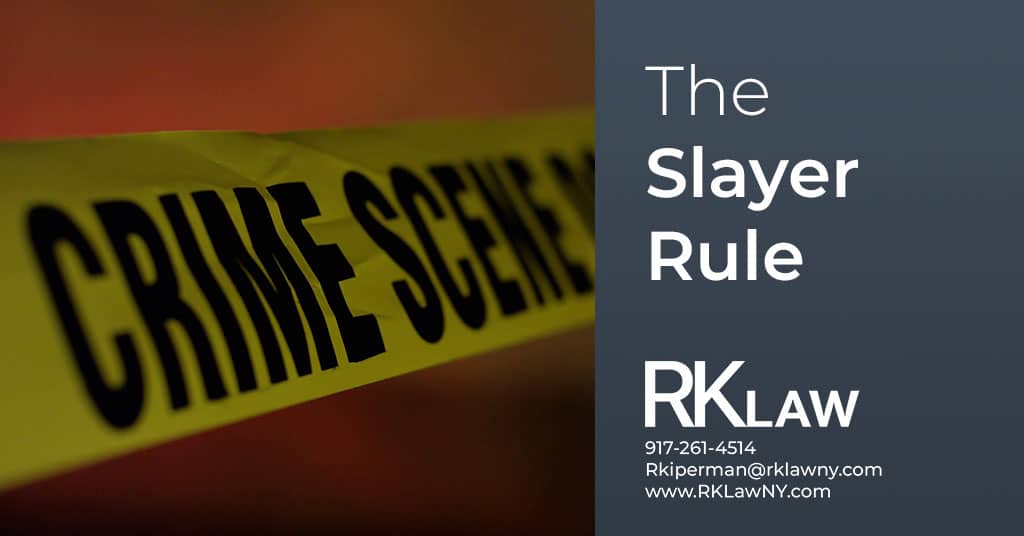What is the Slayer Rule?
The Slayer Rule in New York states that you forfeit any interest you may have in your victim’s estate. If you contributed to a person’s demise, then you cannot inherit from their estate.
Although the slayer rule is not found in a New York statute, the law is found in a number of cases, including Riggs v. Palmer 115 N.Y. 506 (1889).
In Riggs, Elmer Palmer, knowing that he was going to receive a large portion of his grandfather’s estate through his Will, poisoned his grandfather. Elmer’s mother, Mrs. Preston, and Elmer’s aunt, Mrs. Riggs thereafter filed a lawsuit claiming that Elmer should not be allowed to profit from his own crime. The Judge agreed and denied Elmer her inheritance.
The Riggs rule has been followed for over 130 years now. Although it is clear that you cannot benefit from an estate if you are directly involved in the murder, questions have arisen regarding whether you should still benefit if you are indirectly involved or if you are mentally insane at the time of the murder.
Can you Inherit if you are Indirectly Involved in Someone’s Murder?
Suppose that Max kills his mother-in-law, Mary. Mary is survived only by one daughter, Jane. Jane is Max’s wife. A few months after Mary is murdered, Jane dies of a drug overdose.
Although Max may not have been involved in Jane’s drug overdose, Courts have held that individuals like Max still would not be able to inherit anything that passed from Mary to Jane because but for Max’s killing, Mary may still be alive and the assets would not have passed from Mary to Jane.
This was the exact fact pattern in Matter of Edwards, 121 A.D.3d 336 and the son-in-law was not allowed to inherit any portion of the estate that came to him from the mother in law he murdered.
Does Slayer Rule Apply if the Murderer Lacks Mental Capacity?
What happens if Cain kills his brother Abel but then enters into a plea of insanity? Can Cain inherit from Abel’s estate? There are cases (including Matter of Ledson, N.Y.L.J., July 9, 2014, p. 26, col. 5 (Sur. Ct. Kings County)) which provides that a person who is deemed to lack mental capacity at the time of the murder can still inherit from the estate on the theory that punishment is not appropriate for those who cannot tell right from wrong.
However, in another case, the Court distinguished excusing someone from punishment due to insanity versus morally and equitably allowing him to profit. Again, each case will be analyzed separately based on the specific fact before the Court.
Does There have to be a Conviction For Slayer Rule to Apply?
If someone is convicted of murdering another individual from who he stood to inherit, he will lose his inheritance. However, what about an instance when there is no conviction? What happens if someone neglects another person and that neglect causes the death? At least one Court found that though there was no conviction because of mental illness, the slayer could still not inherit.
Jointly Owned Property With Slayer
If a slayer held property jointly with the person that he has killed, then the slayer loses the right to receive the joint owner’s share of the property. In Matter of Stiehler, 11 Misc. 3d 1075(A), 816 N.Y.S.2d 701 (Sur. Ct. Richmond County 2006), the husband was disqualified as a distributee of wife’s estate, and his survivorship rights in jointly owned property extinguished, where he was responsible for her death and confessed to police when arrested, although he died prior to being arraigned.
How to Trigger the Slayer Rule
In order to claim the Slayer Rule, you have to prepare either a probate or administration petition. In that Petition, you must include the slayer as an interested party and request that a Citation be issued. On the Citation, you want to include specific relief that the slayer be disqualified from inheriting property because of their relationship to the death.
Presumably the Slayer will either be in jail or in prison so you will have to serve the citation on the Slayer and the Warden of the Prison or Jail with the Citation.
The Court will likely then appoint a Guardian ad Litem to represent the slayer’s interest in the proceeding. If there is a conviction, then this will certainly help the Court make a determination that slayer is applicable.
If there is a conviction and the Court determines that the Slayer rule applies, then it is as if the slayer has predeceased the Decedent. We can help you with the probate or administration of an estate in the event that you are seeking to apply the Slayer rule.
For more information, please contact NYC Probate Litigation, Guardianship, NYC Probate and Estate Planning attorney Regina Kiperman:
Phone: 917-261-4514
Fax: 929-556-2089
Email: rkiperman@rklawny.com
Or visit her at:
40 Wall Street
Suite 2508
New York, NY 10005
Visit Regina on LinkedIn
Visit Regina on Facebook
This page is made available by the lawyer for educational purposes only as well as to give you general information and a general understanding of the law, not to provide specific legal advice. By using this site you understand that there is no attorney client relationship between you and the lawyer. The post should not be used as a substitute for competent legal advice from a licensed professional attorney in your state. ATTORNEY ADVERTISING.
